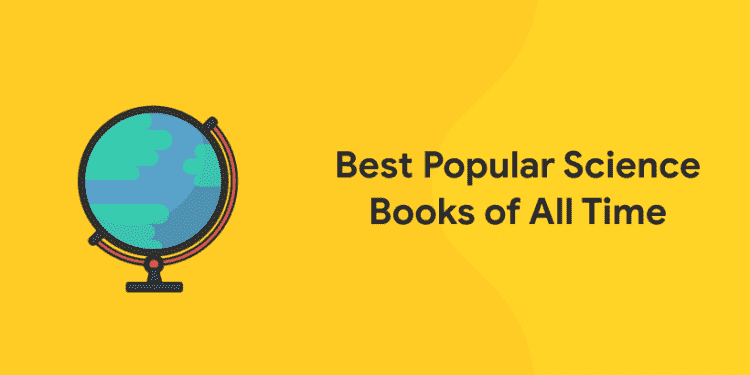Table of Contents
Best Popular Science Books : “The most important science book of all time. Darwin revolutionized our understanding of life, the relationship of humanity to all creatures in the world, and the mythological foundation of all religions.”— geneticist Lee M. Silver, Princeton University. Books are food to the brain. Thoughts can shape themselves into new forms through books. Many of the great scientists have contributed the best books to the world. Books can enlighten and guide us. Many of the new and innovative ideas find their channel through books. Here is the list of famous scientists and their field of study. Get to know the best popular science books here. Happy reading!
13 Most Popular Science Books 2021
1. The Voyage of the Beagle (1845) and The Origin of Species (1859) – Charles Darwin
- One of the natural histories
- The Voyage of the Beagle talks about the young Darwin’s 1831 to 1836 trip to South America
- His trip to the Galápagos Islands, Australia, and returning to England is revealed here
- This is Darwin’s journey that transformed his understanding of biology
- The major development of his ideas about evolution took place during this journey.
- Fossils spring to life on the page as Darwin describes his adventures
- This includes encounters with savages in Tierra del Fuego
- Darwin’s masterwork is The Origin of Species
- He introduced his theory of evolution by natural selection.
- His view was that each species had existed in its current form that humans were a privileged form of life.
- He faced the religious backlash as he kept his ideas secret for almost two decades
- He filled the book with additional observations and experiments.
- His book is accessible and conversational prose
2. Philosophiae Naturalis Principia Mathematica (Mathematical Principles of Natural Philosophy) by Isaac Newton (1687)
- It shows the deconstruction of ellipses and parabolas
- Principia marks the dawn of modern physics
- The book is beginning with the familiar three laws of motion, Newton’s first, second and third laws of motion
- Newton talks about the eccentric paths of comets
- He notes the similarity between sound waves and ripples on a pond
- He states that gravity guides the orbit of the moon
- The text is accessible to common people.
3. Dialogue Concerning the Two Chief World Systems by Galileo Galilei (1632)
- Galileo wrote about neutral treatise on Copernicus’s new
- He talked about the sun-cantered view of the solar system.
- Galileo initiated a conversation between a supporter of Copernicus, an educated layman, and an old-fashioned follower of Aristotle in the book.
- Galileo’s discussions evoke an electrifying sense of discovery.
- Galileo tries to deliver a fatal blow to the church’s Aristotelian thinking
“It’s not only one of the most influential books in the history of the world but a wonderful read. Clear, entertaining, moving, and often hilarious, it showed early on how science writing needn’t be stuffy.”— cognitive scientist Steven Pinker, Harvard University
4. De Revolutionibus Orbium Coelestium (On the Revolutions of Heavenly Spheres) by Nicolaus Copernicus (1543)
- Copernicus published this volume of the book when he was on the death bed
- prefaced the book with a ring-kissing letter to Pope Paul III explaining why this work is worth appreciable.
- Copernicus argued that Earth and the other planets move around the sun
- He rejected the idea that everything is revolving around Earth.
- Thus, scientific thought departs from religious dogma.
- De Revolutionibus is not that user-friendly.
5. Physica (Physics) by Aristotle (circa 330 B.C.)
- Aristotle argued that the Earth is firmly located at the center of the cosmos
- He viewed the universe as a set of nested spheres.
- He mistakenly concluded that things move differently on Earth
“Aristotle opened the door to the empirical sciences, in contrast to Platonism’s love of pure reason. You cannot overestimate his influence on the West and the world.”
5. De Humani Corporis Fabrica (On the Fabric of the Human Body) by Andreas Vesalius (1543)
- In 1543 Andreas Vesalius published the world’s first comprehensive illustrated anatomy textbook.
- anatomists had dissected the human body according to instructions
- Vesalius dispensed that methodology
- He had conducted dissections, reporting findings
- The hundreds of illustrations are given in the book by Vesalius to make the point clearer to the people
6. Relativity: The Special and General Theory by Albert Einstein (1916)
- Albert Einstein’s theories overturned the notions about bodies in motion.
- He showed that time and space are not absolutes.
- Relativity is the most popular concept introduced by Einstein
- His ideas were popularized by this book
7. The Selfish Gene by Richard Dawkins (1976)
- Dawkins argues that our genes do not exist to perpetuate us
- we are useful machines that serve to perpetuate the population
- This was an unexpected shift in perspective
8. One Two Three … Infinity by George Gamow (1947)
- He used Illustrating techniques to draw sketches and make everything meaningful
- Russian-born physicist Gamow covers the gamut of science
- He discussed the Big Bang to the curvature of space and the amount of mysterious genetic material in our bodies.
9. The Double Helix by James D. Watson (1968)
- He gives the account of his role in discovering the structure of DNA
- New scientific knowledge
- But not rated as a first-rate piece of science writing
- Watson gives descriptions of his encounters with DNA researcher Rosalind Franklin.
10. What Is Life? by Erwin Schrödinger (1944)
- classic among biologists
- this volume describes how living organisms differ from inanimate objects like crystals.
- Some editions include an autobiographical sketch
11. The Cosmic Connection by Carl Sagan (1973)
- He championed the search for extra-terrestrial life
- He argued for the likelihood of planets around other stars two decades before they were discovered.
12. The Insect Societies by Edward O. Wilson (1971)
- Modern evolutionary biology explores the lives of ants, termites, bees, and wasps
- 500-page treatise
- Wild scope for new findings
13. The First Three Minutes by Steven Weinberg (1977)
- Weinberg was the winner of the 1979 Nobel Prize in Physics
- Offered the first authoritative account of the Big Bang scenario in The First Three Minutes
- A 1993 afterword discusses more recent advances.
Ace you preparation in General Knowledge! Download Entri App!
Best Science Books to Read in 2021
1: Who was the first woman President of India?
- Silent Spring by Rachel Carson (1962)
- The Mismeasure of Man by Stephen Jay Gould (1981)
- The Man Who Mistook His Wife for a Hat and Other Clinical Tales by Oliver Sacks (1985)
- The Journals of Lewis and Clark by Meriwether Lewis and William Clark (1814)
- The Feynman Lectures on Physics by Richard P. Feynman, Robert B. Leighton, and Matthew Sands (1963)
- Sexual Behaviour in the Human Male by Alfred C. Kinsey et al. (1948)
- Gorillas in the Mist by Dian Fossey (1983)
- Under a Lucky Star by Roy Chapman Andrews (1943)
- Micrographia by Robert Hooke (1665)
- Gaia by James Lovelock (1979)
- Cosmos by Carl Sagan
- Packing for Mars: The Curious Science of Life in the Void by Mary Roach
- Astrophysics for People in a Hurry by Neil deGrasse
- The Edge of Physics by Anil Ananthaswamy
- Hidden Figures: The American Dream and the Untold Story of the Black Women Mathematicians Who Helped Win the Space Race by Margot Lee Shetterly
- A Brief History of Time by Stephen Hawking and Carl Sagan
- Big Bang: The Origin of the Universe by A Brief History of Time
- The Planets by Dava Sobel.
- Brother Astronomer: Adventures of a Vatican Scientist by Brother Guy Consolmagno
- Mapping the Heavens: The Radical Scientific Ideas That Reveal the Cosmos by Priyamvada Natarajan
- The Right Stuff by Tom Wolfe’s
- Turn Left at Orion by Guy Consolmagno and Dan M. Davis.
- The Backyard Astronomer’s Guide
- 365 Starry Nights by Chet Raymo
- Black Holes and Time Warps by Stephen Hawking, Kip S. Thorne
- The Alchemy of the Heavens by Ken Croswell
- The Day We Found the Universe by Marcia Bartusiak
- The Black Hole War by Leonard Susskind.
- Breaking the Chains of Gravity: The Story of Spaceflight before NASA by Amy Shira Teitel
- Exoplanets and Alien Solar Systems by Tahir Yaqoob.
- The Immortal Life of Henrietta Lacks by Rebecca Skloot
- The Epigenetics Revolution: How Modern Biology Is Rewriting Our Understanding of Genetics, Disease, and Inheritance by Nessa Carey
- The Drunken Botanist by Amy Stewart
- The Sixth Extinction: An Unnatural History by Elizabeth Kolbert
- The Woman with a Worm in Her Head: And Other True Stories of Infectious Disease by Pamela Nagami
- Silent Spring by Rachel Carson
- The Origin of the Species by Darwin
- Silent World by Jacques Cousteau
- Wonderful Life by Stephen Jay
- Birds of America by John James
- Krakatoa: The Day the World Exploded by Simon Winchester
- Isaac’s Storm by Galveston, Texas
- How to Cool the Planet
- In the Shadow of Man by Jane Goodall’s
- Born Free: A Lioness of Two Worlds by Joy Adamson
- The Death and Life of the Great Lakes by Dan Egan
- Sex in the Sea: Our Intimate Connection with Sex-Changing Fish, Romantic Lobsters, Kinky Squid, and Other Salty Erotica of the Deep by Marah J. Hardt
- Life on the Edge: The Coming of Age of Quantum Biology by Johnjoe McFadden and Jim Al-Khalili
- Cannibalism: A Perfectly Natural History by Bill Schutt
- Natural History: A Selection by Pliny the Elder
- Hyperspace by Michio Kaku
- The Age of Entanglement by Louisa Gilder
- Basic Physics by Karl F. Kuhn
- The Dancing Wu Li Masters.
- Magic Furnace by Marcus Choun.
- Only the Longest Threads by Tasneem Zehra Husain
- The Trouble With Physics: The Rise of String Theory, the Fall of a Science, and What Comes Next by Lee Smolin
- 101 Quantum Questions: What You Need to Know About the World You Can’t See by Kenneth W. Ford and illustrator Paul Hewitt
- The Woman Who Knew Too Much: Alice Stewart and the Secrets of Radiation by Alice Stewart
- Most Wanted Particle: The Inside Story of the Hunt for the Higgs, the Heart of the Future of Physics by Jon Butterworth
- Martians of Science: Five Physicists Who Changed the Twentieth Century by Istvan Hargittai
- Relativity by Albert Einstein
- Six Easy Pieces by Richard Feynman
- The Cosmic Landscape by Leonard Susskind
- The Elegant Universe
- E=mc2: A Biography of the World’s Most Famous Equation by David Bodanis
- The Five Ages of the Universe
- Edge of the Universe
- The Theoretical Minimum
- Chaos: Making a New Science by James Gleick
Top Scientists and their Field of Study
| Name | Field of Study |
| James Watson | Molecular Biology—DNA |
| Steven Weinberg | Theoretical Physics |
| George Whitesides | Chemistry—Spectroscopy |
| Edward Wilson | Biology—Myrmecology |
| Edward Witten | String Theory |
| Shinya Yamanaka | Stem Cell Research |
| Dennis Bray | Molecular Biology |
| Sydney Brenner | Biology—Genetics |
| Pierre Chambon | Genetics & Cellular Biology |
| Simon Conway Morris | Evolutionary Paleobiology |
| Mildred Dresselhaus | Carbon Science |
| Gerald M. Edelman | Neuroscience |
| Ronald Evans | Molecular Genetics |
| Anthony Fauci | Immunology—HIV |
| Anthony Fire | Genetics—RNAi |
| Jean Fréchet | Biotechnology |
| Margaret Geller | Astronomy |
| Jane Goodall | Primatologist |
| Alan Guth | Inflationary Cosmology |
| Lene Vestergaard Hau | Quantum Physics |
| Stephen Hawking | Physics & Cosmology |
| Peter Higgs | Physics—Higgs Boson |
| Leroy Hood | Systems Biology |
| Eric Kandel | Neuroscience |
| Andrew Knoll | Paleontology |
| Charles Kao | Fibre Optics |
| Martin Karplus | Quantum Chemistry |
| Donald Knuth | Computer Programming |
| Robert Marks II | Computational Intelligence |
| Craig Mello | Molecular Medicine |
| Luc Montagnier | Immunology—HIV |
| Gordon Moore | Physicist—Intel Corp. |
| Kary Mullis | DNA Chemist |
| C. Nüsslein- Volhard | Developmental Biology |
| Seiji Ogawa | FMRI Technology |
| Jeremiah Ostriker | Astrophysics |
| Roger Penrose | Mathematics & Physics |
| Stanley Prusiner | Neurodegeneration |
| Henry F. Schaefer III | Quantum Chemistry |
| Thomas Südhof | Neurotransmission |
| Jack Szostak | Genetics |
| James Tour | Nanotechnology |
| Charles Townes | Quantum Electronics |
| Harold Varmus | Oncology |
| Craig Venter | Human Genetics |
| Alain Aspect | Quantum Theory |
| David Baltimore | Virology—HIV & Cancer |
| Allen Bard | Electrochemistry |
| Timothy Berners- Lee | Computer Science (WWW) |
| John Tyler Bonner | Evolutionary Biology |
The Books are treasures of knowledge. Best Science Books will lead you to discover more in the field of science. If you are also fond of books and science, acquire the latest General Knowledge and current affairs updates from Entri App. Get access to Entri App for interesting quiz and games to learn GK better!















